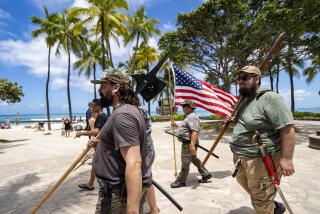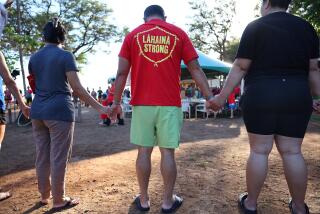Hawaiians Win Halt to Island Bombing
HONOLULU — President Bush on Monday halted the bombing of Kahoolawe, a Hawaiian island that has been used for target practice since World War II.
“This is great news for the people of Hawaii,” Gov. John Waihee said. “We have waited a long time for this day.”
The island, named on the National Register of Historic Places for its cultural and archeological features, has become an important symbol to the Hawaiian people.
Bush ordered the secretary of the Navy to stop using Kahoolawe as a weapons range immediately and directed the Department of Defense and Hawaii state officials to set up a commission to examine the island’s future.
A group of activists began the struggle for the island’s return in 1976, when they landed illegally on its shores and were arrested by Navy authorities.
The group, known as Protect Kahoolawe Ohana, later sued the Navy on environmental and historic preservation grounds. A 1980 consent decree gave the group the right to visit the island 10 times a year. It also limited the shelling and required the Navy to preserve historic sites and aid in revegetation.
The 1953 Executive Order that formally handed the island to the Navy stipulated that Kahoolawe was to be returned to civilian status in “reasonably safe” condition once it was no longer needed. The Pentagon maintained that the island was vital to national security and had shown no inclination to give it up. The Navy says the 45-square-mile island is the only spot in the Pacific that allows for coordinated troop, air and amphibious practice.
The first sign of movement came in May, when U.S. Rep. Patricia Saiki, a Republican who is running for the Senate, raised the issue with Bush and the President ordered a National Security Council review of the issue.
The timing of Monday’s announcement was fortuitous for Saiki, who is locked in a tight election race with Democratic Sen. Daniel K. Akaka. Bush is to visit Hawaii on Friday to stump for Saiki.
More to Read
Sign up for Essential California
The most important California stories and recommendations in your inbox every morning.
You may occasionally receive promotional content from the Los Angeles Times.










